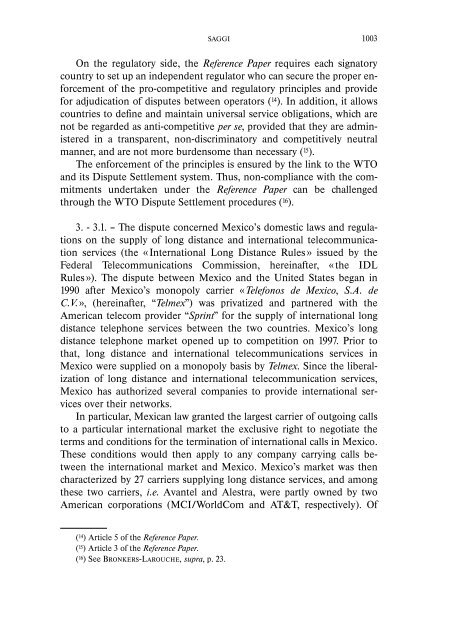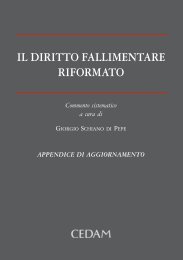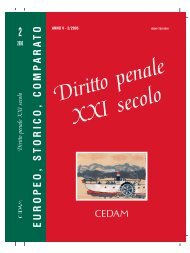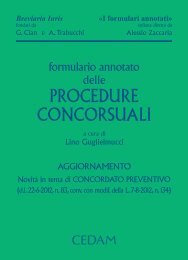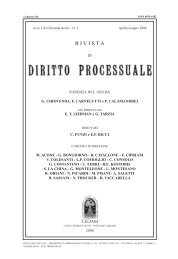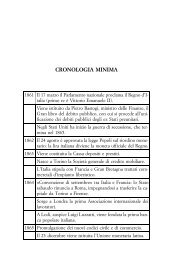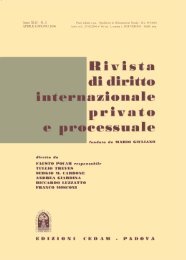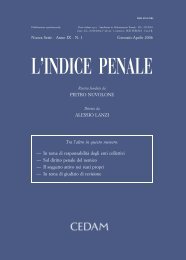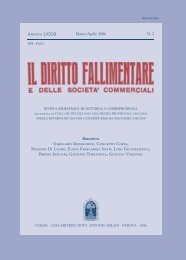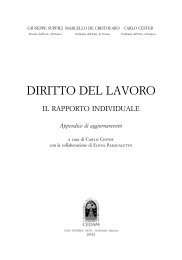- Page 1:
PUBBLICAZIONE SEMESTRALE ISSN 1127-
- Page 4 and 5:
PROPRIETÀ LETTERARIA RISERVATA ´
- Page 6 and 7:
VI INDICE SOMMARIO Sommario: 1. Pre
- Page 8 and 9:
VIII INDICE SOMMARIO native. - 9. I
- Page 11:
Hanno collaborato a questo numero:
- Page 14 and 15:
618 CONTRATTO E IMPRESA / EUROPA I
- Page 16 and 17:
620 CONTRATTO E IMPRESA / EUROPA th
- Page 18 and 19:
622 CONTRATTO E IMPRESA / EUROPA wi
- Page 20 and 21:
624 CONTRATTO E IMPRESA / EUROPA wh
- Page 22 and 23:
626 CONTRATTO E IMPRESA / EUROPA He
- Page 24 and 25:
628 CONTRATTO E IMPRESA / EUROPA re
- Page 26 and 27:
630 CONTRATTO E IMPRESA / EUROPA th
- Page 28 and 29:
632 CONTRATTO E IMPRESA / EUROPA te
- Page 30 and 31:
634 CONTRATTO E IMPRESA / EUROPA sc
- Page 32 and 33:
636 CONTRATTO E IMPRESA / EUROPA Ne
- Page 34 and 35:
638 CONTRATTO E IMPRESA / EUROPA to
- Page 36 and 37:
640 CONTRATTO E IMPRESA / EUROPA fo
- Page 38 and 39:
642 CONTRATTO E IMPRESA / EUROPA em
- Page 40 and 41:
644 CONTRATTO E IMPRESA / EUROPA It
- Page 42 and 43:
646 CONTRATTO E IMPRESA / EUROPA pr
- Page 44 and 45:
648 CONTRATTO E IMPRESA / EUROPA th
- Page 46 and 47:
650 CONTRATTO E IMPRESA / EUROPA bu
- Page 48 and 49:
652 CONTRATTO E IMPRESA / EUROPA cl
- Page 50 and 51:
654 CONTRATTO E IMPRESA / EUROPA Th
- Page 52 and 53:
656 CONTRATTO E IMPRESA / EUROPA de
- Page 54 and 55:
658 CONTRATTO E IMPRESA / EUROPA fe
- Page 56 and 57:
660 CONTRATTO E IMPRESA / EUROPA wi
- Page 58 and 59:
662 CONTRATTO E IMPRESA / EUROPA re
- Page 60 and 61:
664 CONTRATTO E IMPRESA / EUROPA Su
- Page 62 and 63:
666 CONTRATTO E IMPRESA / EUROPA th
- Page 64 and 65:
668 CONTRATTO E IMPRESA / EUROPA si
- Page 66 and 67:
670 CONTRATTO E IMPRESA / EUROPA e.
- Page 68 and 69:
672 CONTRATTO E IMPRESA / EUROPA Fr
- Page 70 and 71:
674 CONTRATTO E IMPRESA / EUROPA me
- Page 72 and 73:
676 CONTRATTO E IMPRESA / EUROPA co
- Page 74 and 75:
678 CONTRATTO E IMPRESA / EUROPA zi
- Page 76 and 77:
680 CONTRATTO E IMPRESA / EUROPA Il
- Page 78 and 79:
682 CONTRATTO E IMPRESA / EUROPA ta
- Page 80 and 81:
684 CONTRATTO E IMPRESA / EUROPA ta
- Page 82 and 83:
686 CONTRATTO E IMPRESA / EUROPA Pe
- Page 84 and 85:
688 CONTRATTO E IMPRESA / EUROPA to
- Page 86 and 87:
690 CONTRATTO E IMPRESA / EUROPA pa
- Page 88 and 89:
692 CONTRATTO E IMPRESA / EUROPA si
- Page 90 and 91:
694 CONTRATTO E IMPRESA / EUROPA da
- Page 92 and 93:
696 CONTRATTO E IMPRESA / EUROPA ci
- Page 94 and 95:
698 CONTRATTO E IMPRESA / EUROPA ne
- Page 96 and 97:
700 CONTRATTO E IMPRESA / EUROPA pa
- Page 98 and 99:
702 CONTRATTO E IMPRESA / EUROPA re
- Page 100 and 101:
704 CONTRATTO E IMPRESA / EUROPA pr
- Page 102 and 103:
706 CONTRATTO E IMPRESA / EUROPA gi
- Page 104 and 105:
708 CONTRATTO E IMPRESA / EUROPA la
- Page 106 and 107:
710 CONTRATTO E IMPRESA / EUROPA Al
- Page 108 and 109:
712 CONTRATTO E IMPRESA / EUROPA pi
- Page 110 and 111:
714 CONTRATTO E IMPRESA / EUROPA zi
- Page 112 and 113:
716 CONTRATTO E IMPRESA / EUROPA gl
- Page 114 and 115:
718 CONTRATTO E IMPRESA / EUROPA do
- Page 116 and 117:
720 CONTRATTO E IMPRESA / EUROPA de
- Page 118 and 119:
722 CONTRATTO E IMPRESA / EUROPA 1/
- Page 120 and 121:
724 CONTRATTO E IMPRESA / EUROPA Co
- Page 122 and 123:
726 CONTRATTO E IMPRESA / EUROPA In
- Page 124 and 125:
728 CONTRATTO E IMPRESA / EUROPA co
- Page 126 and 127:
730 CONTRATTO E IMPRESA / EUROPA st
- Page 128 and 129:
732 CONTRATTO E IMPRESA / EUROPA de
- Page 130 and 131:
734 CONTRATTO E IMPRESA / EUROPA ri
- Page 132 and 133:
736 CONTRATTO E IMPRESA / EUROPA ce
- Page 134 and 135:
738 CONTRATTO E IMPRESA / EUROPA La
- Page 136 and 137:
740 CONTRATTO E IMPRESA / EUROPA vi
- Page 138 and 139:
742 CONTRATTO E IMPRESA / EUROPA lo
- Page 140 and 141:
744 CONTRATTO E IMPRESA / EUROPA me
- Page 142 and 143:
746 CONTRATTO E IMPRESA / EUROPA re
- Page 144 and 145:
748 CONTRATTO E IMPRESA / EUROPA de
- Page 146 and 147:
750 CONTRATTO E IMPRESA / EUROPA ev
- Page 148 and 149:
752 CONTRATTO E IMPRESA / EUROPA st
- Page 150 and 151:
754 CONTRATTO E IMPRESA / EUROPA Ne
- Page 152 and 153:
756 CONTRATTO E IMPRESA / EUROPA me
- Page 154 and 155:
758 CONTRATTO E IMPRESA / EUROPA D.
- Page 156 and 157:
760 CONTRATTO E IMPRESA / EUROPA In
- Page 158 and 159:
762 CONTRATTO E IMPRESA / EUROPA Se
- Page 160 and 161:
764 CONTRATTO E IMPRESA / EUROPA no
- Page 162 and 163:
766 CONTRATTO E IMPRESA / EUROPA Vi
- Page 164 and 165:
768 CONTRATTO E IMPRESA / EUROPA ch
- Page 166 and 167:
770 CONTRATTO E IMPRESA / EUROPA e
- Page 168 and 169:
772 CONTRATTO E IMPRESA / EUROPA «
- Page 170 and 171:
774 CONTRATTO E IMPRESA / EUROPA fr
- Page 172 and 173:
776 CONTRATTO E IMPRESA / EUROPA in
- Page 174 and 175:
LUIGI A. SCARANO Notificazione e co
- Page 176 and 177:
780 CONTRATTO E IMPRESA / EUROPA to
- Page 178 and 179:
782 CONTRATTO E IMPRESA / EUROPA de
- Page 180 and 181:
784 CONTRATTO E IMPRESA / EUROPA An
- Page 182 and 183:
786 CONTRATTO E IMPRESA / EUROPA ar
- Page 184 and 185:
788 CONTRATTO E IMPRESA / EUROPA 3.
- Page 186 and 187:
790 CONTRATTO E IMPRESA / EUROPA 14
- Page 188 and 189:
792 CONTRATTO E IMPRESA / EUROPA de
- Page 190 and 191:
794 CONTRATTO E IMPRESA / EUROPA de
- Page 192 and 193:
796 CONTRATTO E IMPRESA / EUROPA 8.
- Page 194 and 195:
798 CONTRATTO E IMPRESA / EUROPA L
- Page 196 and 197:
800 CONTRATTO E IMPRESA / EUROPA pr
- Page 198 and 199:
802 CONTRATTO E IMPRESA / EUROPA pe
- Page 200 and 201:
804 CONTRATTO E IMPRESA / EUROPA sl
- Page 202 and 203:
806 CONTRATTO E IMPRESA / EUROPA co
- Page 204 and 205:
808 CONTRATTO E IMPRESA / EUROPA ma
- Page 206 and 207:
810 CONTRATTO E IMPRESA / EUROPA Al
- Page 208 and 209:
812 CONTRATTO E IMPRESA / EUROPA al
- Page 210 and 211:
814 CONTRATTO E IMPRESA / EUROPA te
- Page 212 and 213:
816 CONTRATTO E IMPRESA / EUROPA (i
- Page 214 and 215:
818 CONTRATTO E IMPRESA / EUROPA re
- Page 216 and 217:
820 CONTRATTO E IMPRESA / EUROPA co
- Page 218 and 219:
822 CONTRATTO E IMPRESA / EUROPA A
- Page 220 and 221:
824 CONTRATTO E IMPRESA / EUROPA Ne
- Page 222 and 223:
826 CONTRATTO E IMPRESA / EUROPA lo
- Page 224 and 225:
828 CONTRATTO E IMPRESA / EUROPA La
- Page 226 and 227:
830 CONTRATTO E IMPRESA / EUROPA li
- Page 228 and 229:
832 CONTRATTO E IMPRESA / EUROPA St
- Page 230 and 231:
834 CONTRATTO E IMPRESA / EUROPA di
- Page 232 and 233:
836 CONTRATTO E IMPRESA / EUROPA Le
- Page 234 and 235:
838 CONTRATTO E IMPRESA / EUROPA o
- Page 236 and 237:
840 CONTRATTO E IMPRESA / EUROPA mu
- Page 238 and 239:
842 CONTRATTO E IMPRESA / EUROPA Ta
- Page 240 and 241:
844 CONTRATTO E IMPRESA / EUROPA In
- Page 242 and 243:
846 CONTRATTO E IMPRESA / EUROPA in
- Page 244 and 245:
848 CONTRATTO E IMPRESA / EUROPA Se
- Page 246 and 247:
850 CONTRATTO E IMPRESA / EUROPA va
- Page 248 and 249:
852 CONTRATTO E IMPRESA / EUROPA la
- Page 250 and 251:
854 CONTRATTO E IMPRESA / EUROPA of
- Page 252 and 253:
856 CONTRATTO E IMPRESA / EUROPA lo
- Page 254 and 255:
858 CONTRATTO E IMPRESA / EUROPA zi
- Page 256 and 257:
860 CONTRATTO E IMPRESA / EUROPA l
- Page 258 and 259:
862 CONTRATTO E IMPRESA / EUROPA de
- Page 260 and 261:
864 CONTRATTO E IMPRESA / EUROPA ne
- Page 262 and 263:
866 CONTRATTO E IMPRESA / EUROPA de
- Page 264 and 265:
868 CONTRATTO E IMPRESA / EUROPA Gl
- Page 266 and 267:
870 CONTRATTO E IMPRESA / EUROPA co
- Page 268 and 269:
872 CONTRATTO E IMPRESA / EUROPA Qu
- Page 270 and 271:
874 CONTRATTO E IMPRESA / EUROPA Le
- Page 272 and 273:
876 CONTRATTO E IMPRESA / EUROPA de
- Page 274 and 275:
878 CONTRATTO E IMPRESA / EUROPA da
- Page 276 and 277:
880 CONTRATTO E IMPRESA / EUROPA L
- Page 278 and 279:
882 CONTRATTO E IMPRESA / EUROPA st
- Page 280 and 281:
884 CONTRATTO E IMPRESA / EUROPA Au
- Page 282 and 283:
886 CONTRATTO E IMPRESA / EUROPA è
- Page 284 and 285:
888 CONTRATTO E IMPRESA / EUROPA go
- Page 286 and 287:
890 CONTRATTO E IMPRESA / EUROPA da
- Page 288 and 289:
892 CONTRATTO E IMPRESA / EUROPA re
- Page 290 and 291:
894 CONTRATTO E IMPRESA / EUROPA de
- Page 292 and 293:
896 CONTRATTO E IMPRESA / EUROPA ra
- Page 294 and 295:
898 CONTRATTO E IMPRESA / EUROPA se
- Page 296 and 297:
900 CONTRATTO E IMPRESA / EUROPA An
- Page 298 and 299:
902 CONTRATTO E IMPRESA / EUROPA mu
- Page 300 and 301:
904 CONTRATTO E IMPRESA / EUROPA Pe
- Page 302 and 303:
906 CONTRATTO E IMPRESA / EUROPA ta
- Page 304 and 305:
908 CONTRATTO E IMPRESA / EUROPA zi
- Page 306 and 307:
910 CONTRATTO E IMPRESA / EUROPA BG
- Page 308 and 309:
912 CONTRATTO E IMPRESA / EUROPA no
- Page 310 and 311:
914 CONTRATTO E IMPRESA / EUROPA mo
- Page 312 and 313:
916 CONTRATTO E IMPRESA / EUROPA ci
- Page 314 and 315:
918 CONTRATTO E IMPRESA / EUROPA no
- Page 316 and 317:
920 CONTRATTO E IMPRESA / EUROPA ma
- Page 318 and 319:
ANTONIO ALBANESE Il rapporto tra re
- Page 320 and 321:
924 CONTRATTO E IMPRESA / EUROPA Il
- Page 322 and 323:
926 CONTRATTO E IMPRESA / EUROPA nu
- Page 324 and 325:
928 CONTRATTO E IMPRESA / EUROPA (v
- Page 326 and 327:
930 CONTRATTO E IMPRESA / EUROPA Bo
- Page 328 and 329:
932 CONTRATTO E IMPRESA / EUROPA ce
- Page 330 and 331:
934 CONTRATTO E IMPRESA / EUROPA «
- Page 332 and 333:
936 CONTRATTO E IMPRESA / EUROPA La
- Page 334 and 335:
938 CONTRATTO E IMPRESA / EUROPA pr
- Page 336 and 337:
940 CONTRATTO E IMPRESA / EUROPA tr
- Page 338 and 339:
942 CONTRATTO E IMPRESA / EUROPA ca
- Page 340 and 341:
944 CONTRATTO E IMPRESA / EUROPA Pe
- Page 342 and 343:
946 CONTRATTO E IMPRESA / EUROPA ti
- Page 344 and 345:
948 CONTRATTO E IMPRESA / EUROPA co
- Page 346 and 347:
950 CONTRATTO E IMPRESA / EUROPA Il
- Page 348 and 349: 952 CONTRATTO E IMPRESA / EUROPA o
- Page 350 and 351: 954 CONTRATTO E IMPRESA / EUROPA so
- Page 352 and 353: 956 CONTRATTO E IMPRESA / EUROPA de
- Page 354 and 355: 958 CONTRATTO E IMPRESA / EUROPA sp
- Page 356 and 357: 960 CONTRATTO E IMPRESA / EUROPA ca
- Page 358 and 359: 962 CONTRATTO E IMPRESA / EUROPA di
- Page 360 and 361: 964 CONTRATTO E IMPRESA / EUROPA po
- Page 362 and 363: 966 CONTRATTO E IMPRESA / EUROPA Ne
- Page 364 and 365: 968 CONTRATTO E IMPRESA / EUROPA Pr
- Page 366 and 367: 970 CONTRATTO E IMPRESA / EUROPA ri
- Page 368 and 369: 972 CONTRATTO E IMPRESA / EUROPA no
- Page 370 and 371: 974 CONTRATTO E IMPRESA / EUROPA Ai
- Page 372 and 373: 976 CONTRATTO E IMPRESA / EUROPA ri
- Page 374 and 375: 978 CONTRATTO E IMPRESA / EUROPA su
- Page 376 and 377: 980 CONTRATTO E IMPRESA / EUROPA la
- Page 378 and 379: 982 CONTRATTO E IMPRESA / EUROPA La
- Page 380 and 381: 984 CONTRATTO E IMPRESA / EUROPA ga
- Page 382 and 383: 986 CONTRATTO E IMPRESA / EUROPA fr
- Page 384 and 385: 988 CONTRATTO E IMPRESA / EUROPA st
- Page 386 and 387: 990 CONTRATTO E IMPRESA / EUROPA «
- Page 388 and 389: 992 CONTRATTO E IMPRESA / EUROPA mi
- Page 390 and 391: 994 CONTRATTO E IMPRESA / EUROPA Il
- Page 392 and 393: 996 CONTRATTO E IMPRESA / EUROPA L
- Page 394 and 395: EUGENIA C. LAURENZA-MIRIAM KOMINARE
- Page 396 and 397: 1000 CONTRATTO E IMPRESA / EUROPA c
- Page 400 and 401: 1004 CONTRATTO E IMPRESA / EUROPA t
- Page 402 and 403: 1006 CONTRATTO E IMPRESA / EUROPA T
- Page 404 and 405: 1008 CONTRATTO E IMPRESA / EUROPA p
- Page 406 and 407: 1010 CONTRATTO E IMPRESA / EUROPA w
- Page 408 and 409: 1012 CONTRATTO E IMPRESA / EUROPA m
- Page 411 and 412: 1. - Introduzione Osservatorio sul
- Page 413 and 414: OSSERVATORIO SUL DIRITTO EUROPEO 10
- Page 415 and 416: OSSERVATORIO SUL DIRITTO EUROPEO 10
- Page 417 and 418: OSSERVATORIO SUL DIRITTO EUROPEO 10
- Page 419 and 420: OSSERVATORIO SUL DIRITTO EUROPEO 10
- Page 421 and 422: OSSERVATORIO SUL DIRITTO EUROPEO 10
- Page 423 and 424: OSSERVATORIO SUL DIRITTO EUROPEO 10
- Page 425 and 426: OSSERVATORIO SUL DIRITTO EUROPEO 10
- Page 427 and 428: OSSERVATORIO SUL DIRITTO EUROPEO 10
- Page 429 and 430: OSSERVATORIO SUL DIRITTO EUROPEO 10
- Page 431 and 432: OSSERVATORIO SUL DIRITTO EUROPEO 10
- Page 433 and 434: OSSERVATORIO SUL DIRITTO EUROPEO 10
- Page 435 and 436: OSSERVATORIO SUL DIRITTO EUROPEO 10
- Page 437 and 438: OSSERVATORIO SUL DIRITTO EUROPEO 10
- Page 439 and 440: OSSERVATORIO SUL DIRITTO EUROPEO 10
- Page 441 and 442: OSSERVATORIO SUL DIRITTO EUROPEO 10
- Page 443 and 444: OSSERVATORIO SUL DIRITTO EUROPEO 10
- Page 445 and 446: OSSERVATORIO SUL DIRITTO EUROPEO 10
- Page 447 and 448: OSSERVATORIO SUL DIRITTO EUROPEO 10
- Page 449 and 450:
OSSERVATORIO SUL DIRITTO EUROPEO 10
- Page 451 and 452:
OSSERVATORIO SUL DIRITTO EUROPEO 10
- Page 453 and 454:
OSSERVATORIO SUL DIRITTO EUROPEO 10
- Page 455 and 456:
terconnessione messicane, imposte d
- Page 457 and 458:
OSSERVATORIO SUL DIRITTO EUROPEO 10
- Page 459 and 460:
OSSERVATORIO SUL DIRITTO EUROPEO 10
- Page 461 and 462:
OSSERVATORIO SUL DIRITTO EUROPEO 10
- Page 463 and 464:
OSSERVATORIO SUL DIRITTO EUROPEO 10
- Page 465 and 466:
OSSERVATORIO SUL DIRITTO EUROPEO 10
- Page 467 and 468:
venienti da diversi paesi beneficia
- Page 469 and 470:
In questo secondo procedimento, l
- Page 471 and 472:
Note minime in margine alla pronunc
- Page 473 and 474:
OSSERVATORIO SUL DIRITTO EUROPEO 10
- Page 475 and 476:
OSSERVATORIO SUL DIRITTO EUROPEO 10
- Page 477:
OSSERVATORIO SUL DIRITTO EUROPEO 10
- Page 480 and 481:
1084 CONTRATTO E IMPRESA / EUROPA 2
- Page 482 and 483:
1086 CONTRATTO E IMPRESA / EUROPA g
- Page 485 and 486:
INDICI GENERALI DEL 2006 INDICE SOM
- Page 487 and 488:
INDICI GENERALI 2006 1091 del contr
- Page 489 and 490:
INDICI GENERALI 2006 1093 gimi e le
- Page 491 and 492:
INDICI GENERALI 2006 1095 trattuale
- Page 493 and 494:
INDICI GENERALI 2006 1097 Heininger
- Page 495 and 496:
1. LE MONOGRAFIE DI « CONTRATTO E
- Page 497 and 498:
71. Gianluca Riolfo, I patti paraso
- Page 499 and 500:
24. La vendita. A cura di Marino Bi
- Page 502 and 503:
Novità I libri de LE NUOVE LEGGI C
- Page 504 and 505:
Novità Collana: Trattato di diritt
- Page 506:
Contratto e impresa / Europa è uno


